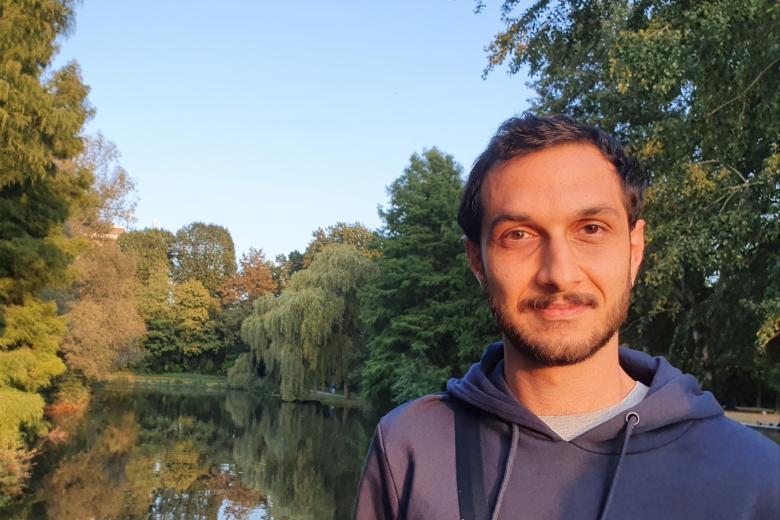Thesis / Student projects
Available student projects
Exploring brain plasticity underlying adaptive auditory processing
Supervisor: Michelle Moerel, assistant professor (michelle.moerel@maastrichtuniversity.nl)
Description:
Hearing, understanding, and interacting with sounds is crucial in our everyday life. While seemingly straightforward, hearing is an extremely adaptive and flexible process. For example, in a noisy environment, we can tune in to those sounds that are currently important to us, and we can learn to recognize the voice of a new friend. Recent invasive studies showed that this flexibility is accompanied by rapid and/or long-lasting changes in brain processing.
Various projects are planned to study adaptive auditory processing. In a student project, you could either focus on ultra-high field (f)MRI data analysis to for example investigate small subcortical auditory structures and layer-specific cortical processes, or instead on computational modeling of brain plasticity. The exact content and focus of the project will be determined together with the student.
- Keywords: Brain plasticity, ultra-high field MRI, computational neuroscience
- Required knowledge/skills: Programming skills (Matlab) and background in neuroscience, or otherwise a strong motivation to learn these skills.
- Suitable for Bachelor and Master students.
Exploring ionic neuromodulation for epilepsy treatment
Supervisor: Prof. Renaud Jolivet (r.jolivet@maastrichtuniversity.nl)
Description:
Participate in an EU-funded project to develop a novel type of brain-machine interface to modulate neuronal activity by ionic actuation and to detect and prevent epileptic seizures (see here https://cordis.europa.eu/project/id/862882 for more information). We are developing a totally new approach to manipulate neuronal cell excitability – applying neuronal firing by direct ionic actuation at the microscopic scale and monitoring cell responses by nanoscale transistors.
Various questions are being investigated. In this student project, you will use MATLAB simulations to investigate the impact of ionic neuromodulation on neurons at the cellular and subcellular levels. The exact content and focus of the project will be determined together with the student based on their profile.
- Keywords: Brain-machine interfaces – ionic neuromodulation – computational neuroscience
- Required knowledge/skills: Programming skills (MATLAB) and background in neuroscience, or otherwise a strong motivation to learn these skills.
- Suitable for Bachelor and Master students.
Feeding our genes: the interplay between (epi)genetic regulation and metabolism
Supervisor: Michiel Adriaens, assistant professor (michiel.adriaens@maastrichtuniversity.nl)
Description:
According to Richard Dawkins, we are nothing more than our genes. According to nutritionists, we are what we eat. What if they are both right?
In this project, you will focus on investigating the genetic and epigenetic regulation of metabolism in humans. Metabolism is a complex trait, meaning that variability from person to person is explained by a complex combination of gene-environment interactions. Hence, investigating genetic variability and epigenetic changes in the genome is key to getting a better understanding of metabolic heterogeneity between individuals. Both can be quantified using -omics technologies.
Using genomics and epigenomics data and a combination of data-driven (e.g. network analysis) and knowledge-driven (e.g. genome-scale metabolic models) approaches, we aim to gain a deeper understanding of the molecular mechanisms underlying metabolic processes and how they are impacted by genetic and epigenetic factors. You will have the opportunity to work with large-scale human -omics data and develop expertise in the field of gene regulation and molecular metabolism. Due to the breadth of available datasets and methods, you will be able to choose the main direction of the internship based on your interests.
Keywords: regulatory (epi)genomics, omics data analysis, metabolism
Required knowledge/skills: Programming skills (Matlab, R), data analysis experience, (statistical) modeling experience, and a background in biomedical science are an advantage. However, a strong motivation to learn these skills is sufficient.
Suitable for Bachelor and Master students.
Functional characterization of mitochondrial DNA maintenance proteins
Supervisor: Mike Gerards, assistant professor (mike.gerards@maastrichtuniversity.nl)
Description:
We applied computational approaches and integrative systems biology methods to identify novel proteins involved in mtDNA maintenance. The aim of this project is the functional characterization of the candidate proteins identified by computational approaches. Candidate proteins will be knocked down in cell lines followed by functional measurements of mitochondrial functioning like mtDNA quality and quantity, mitochondrial transcripts, OXPHOS integrity, subcellular localization studies, and others.
The discovery and functional characterization of novel components of mtDNA maintenance will improve our understanding of these processes in health and disease. Moreover, it will improve genetic diagnostic tests and open possibilities for designing therapeutic interventions, improving the quality of life for patients with mitochondrial disorders.
Mitochondrial disorders are the most common inherited metabolic disorders affecting over 1 in 5000 people. Although rapid progress in characterizing the mitochondrial proteome has fueled progress in understanding the role of mitochondria in health and disease, functional information is lacking for half of the proteins in the mitochondrial proteome. Moreover, the mitochondrial proteome is believed to be far from complete. As a result, 40-50% of mitochondrial patients remain genetically undiagnosed.
- Keywords: mitochondrial dynamics, wetlab, molecular biology
- Required knowledge/skills: basic molecular biology
- Suitable for Bachelor and Master students.
Fusion and fission: the orchestra of mitochondrial dynamics
Supervisor: Mike Gerards, assistant professor (mike.gerards@maastrichtuniversity.nl)
Description:
Mitochondria are dynamic organelles crucial for cellular energy production. Their dynamic nature enables them to adapt their morphology to the physiological needs of the cell, through the process of fusion and fission, collectively referred to as mitochondrial dynamics. Although several mitochondrial dynamics proteins have been identified, not all involved proteins and mechanisms are known, restricting our understanding of disorders originating from a defect in mitochondrial dynamics. The aim of our research is to identify and functionally characterize novel mitochondrial dynamics proteins. Through computational approaches based on protein-protein interactions, we identified several novel mitochondrial dynamics candidate proteins. In order to elucidate their exact role in mitochondrial dynamics, we perform functional experiments including gene-specific knockdown, assessment of mitochondrial morphology through fluorescent and electron microscopy, subcellular localization studies, assessment of mitochondrial activity, and many others. Moreover, we generated RNA-seq data from cells in which established mitochondria dynamics proteins and novel candidate proteins were knocked down. This data will be used for regulatory network analysis and metabolic modeling to unravel the mechanisms and pathways involved, leading to a better understanding of mitochondrial dynamics in health and disease.
- Keywords: mitochondrial dynamics, molecular biology, RNAseq
- Required knowledge/skills: Genomics, Molecular (Cell) Biology, Systems Biology
- Suitable for Bachelor and Master students.
Improving metabolic network modeling methods
Supervisor: Marian Breuer, assistant professor (marian.breuer@maastrichtuniversity.nl)
Description:
Genome-scale metabolic network models provide a powerful framework for the study of human metabolism in health and disease. These models can be constructed using omics data and analyzed and compared through different modeling methods. We work to actively develop some of these methods further. Two particular foci in this project are: Mathematically analyzing ways of mapping omics data onto metabolic network models, and mathematically comparing the possible reaction flux distributions between two metabolic networks.
- Keywords: Metabolic modeling, mathematical modeling
- Required knowledge/skills: Primarily some computational and scripting skills, preferably in Matlab. Some basic knowledge of biochemistry and cellular metabolism would be a plus.
- Suitable for Bachelor and Master students.
Investigating the players of our defense system
Supervisor: Martina Summer-Kutmon, assistant professor (martina.kutmon@maastrichtuniversity.nl)
Description:
Using state-of-the-art systems biology approaches, you will investigate the differences in gene expression between the cell types. Additionally, we are interested in how these immune cells are affected by genetic variations, which are often associated with increased risk for human diseases.
Living cells are complex. The average human body consists of approximately 37 trillion cells each containing thousands of molecules that work together to enable the cell to carry out its specific function. In this project, you will specifically look at immune cells, the key players of our defense system.
The DICE database (database of immune cell expression, expression quantitative trait loci [eQTLs], and epigenomics) provides a high-quality dataset with gene expression and eQTLs for 5 different immune-cell types in different activation stages (total of 15 datasets). This data will be used to build and analyze cell-type-specific epigenetic regulatory networks.
- Keywords: Network biology, regulation, immune system
- Required knowledge/skills: Basic biology, network biology approaches (or an interest in learning)
- Suitable for Bachelor and Master students.
Learning and memory: From gene networks to brain activation patterns
Supervisor: Michelle Moerel, assistant professor (michelle.moerel@maastrichtuniversity.nl)
Description:
In recent years, advances in non-invasive neuroimaging and genetics have created the possibility to collect large amounts of data in a manageable time period. The question remains whether all this data can help us to elucidate the functioning of the human brain, and to study the influence of genetics on brain processing.
You will work with data from the Human Connectome Project (HCP), consisting of behavioral, neuroimaging, and genetic data. Combined with the appropriate analysis tools, this dataset provides the opportunity to achieve novel insights into the living human brain and to study the effect of our genetic background on brain functioning.
This is a large project with the ultimate goal of connecting processes functioning at the small spatial scale of molecular pathways to the large spatial scales of interacting neuronal populations. In ongoing work, we are exploring brain and genetic correlates of learning and memory performance. The student will be able to choose the main direction of the project based on their interest.
- Keywords: Imaging genetics, systems neuroscience, learning
- Required knowledge/skills: Programming skills (Matlab, R), knowledge of statistics, and a background in neuroscience are an advantage. However, a strong motivation to learn these skills is sufficient.
- Suitable for Bachelor and Master students.
Metabolic modeling of cellular aging
Supervisor: Marian Breuer, assistant professor (marian.breuer@maastrichtuniversity.nl)
Description:
In this project, the links between human aging on a cellular level and cellular metabolism will be explored through metabolic modeling. Exploiting these links is a promising strategy in the development of interventions to extend the healthy lifespan, but their current understanding is far from complete. Metabolic modeling provides an exciting opportunity to address this knowledge gap.
- Keywords: Metabolic modeling, aging
- Required knowledge/skills: Ideally both some basic knowledge of biochemistry and cellular metabolism and some computational and scripting skills, preferably in Matlab.
- Suitable for Bachelor and Master students.
Modeling the Metabolic Diversity of the Brain’s Glial Cells
Supervisors: Prof. Renaud Jolivet (r.jolivet@maastrichtuniversity.nl), Marian Breuer (marian.breuer@maastrichtuniversity.nl)
Description:
This project will study the metabolic functions of different types of glial cells, as well as their metabolic interactions, and how these are affected in aging and different pathological conditions. Glial cells are the non-neuronal cells in the brain, accounting for around half of the brain cell population, and play a pivotal role in brain health and disease. However, while glial cells are known to play an important role in brain metabolism overall, their particular metabolic functions and interactions are far from understood. Metabolic modeling allows studying these complex metabolic features on a comprehensive scale, yielding insights difficult to obtain from experiments.
- Keywords: Glial cells, Neuroscience, Metabolic modeling
- Required knowledge/skills: Ideally both some basic knowledge of biochemistry and cellular metabolism and some computational and scripting skills, preferably in Matlab.
- Suitable for Bachelor and Master students.
Predicting your optimal diet: learning from large nutritional intervention studies
Supervisors: Michiel Adriaens, assistant professor (michiel.adriaens@maastrichtuniversity.nl)
Description:
The prevalence of overweight-related chronic metabolic diseases is increasing worldwide. A central factor in these diseases is impaired blood glucose homeostasis. It is well known that dietary intervention may improve glucose homeostasis, thereby preventing disease development. Yet, results from dietary intervention studies show that what works for one, does not work for all. To go beyond current public health dietary recommendations, at MaCSBio we aim to develop machine learning algorithms to personalize diet and lifestyle to achieve the highest improvement in blood glucose homeostasis.
We have access to large-scale data from unique cohorts and nutritional intervention studies, which we combine with state-of-the-art machine-learning techniques. Given the breadth of the data (molecular, genetic, lifestyle factors, data from wearables) and available methods (elastic net, random forests, deep learning), there is a lot of freedom in the direction and content of the project, which will be determined together with the student.
- Keywords: machine learning, personalized nutrition, disease prevention
- Required knowledge/skills: Programming skills (R, Python), knowledge of statistics, and a background in biomedical science are an advantage. However, a strong motivation to learn these skills is sufficient.
- Suitable for Bachelor and Master students.
Sex-specific modeling of the metabolism of the heart in health and disease
Supervisors: Michiel Adriaens, assistant professor (michiel.adriaens@maastrichtuniversity.nl)
Description:
When it comes to dinner, our heart is one of the most well-behaved organs in our body: it eats everything without complaining. This behavior is called metabolic flexibility. Metabolic flexibility allows the utilization of different energy-providing substrates, such as fat, protein, or carbohydrates, at different rates. This enables the heart to maintain its function in response to changes in workload and substrate concentrations. Under normal conditions, the heart relies heavily on generating energy through so-called oxidative pathways (figure below, left) that take place in the mitochondrion, the “powerhouse of the cell”.
When heart failure occurs, our heart loses its ability to use a wide variety of nutrients for energy production (figure below, right). This loss of metabolic flexibility appears to worsen with disease progression, but it is not clear which metabolic processes are affected nor how these changes differ between men and women. By combining large-scale molecular data from unique heart failure cohorts with computational metabolic models of the heart muscle, we can study the loss of metabolic flexibility during heart failure in detail. In doing so, we might be able to shed some much-needed light on a complex symptom of a deadly disease.
Keywords: metabolic modeling, omics, heart failure
Required knowledge/skills: Programming skills (Matlab, R), knowledge of linear algebra, and a background in biomedical science are an advantage. However, a strong motivation to learn these skills is sufficient.
Suitable for Bachelor and Master students.
-
Overview
-
Exploring brain plasticity underlying adaptive auditory processing
-
Exploring ionic neuromodulation for epilepsy treatment
-
Feeding our genes: the interplay between (epi)genetic regulation and metabolism
-
Functional characterization of mitochondrial DNA maintenance proteins
-
Fusion and fission: the orchestra of mitochondrial dynamics
-
Improving metabolic network modeling methods
-
Investigating the players of our defense system
-
Learning and memory: From gene networks to brain activation patterns
-
Metabolic modeling of cellular aging
-
Modeling the Metabolic Diversity of the Brain’s Glial Cells
-
Predicting your optimal diet: learning from large nutritional intervention studies
-
Sex-specific modeling of the metabolism of the heart in health and disease
Student experiences
Hannah Schultheiß
Maastricht Science Programme at UM, intern in 2020/2021
"My thesis project at MaCSBio strengthened my interest in Systems Biology. I especially appreciated learning about the broad applications that the field offers."

Wei Chen (Katherine) Kao
Master student at Tohoku University, Japan, intern in 2020/2021
"I learned a lot during my thesis project and I really enjoyed the atmosphere in MaCSBio. Being able to have this experience to work in MaCSBio was very nice, as I can use computational approaches to solve scientific problems during my PhD."

Mehrdad Pouyanfar
Master Data Science and Knowledge Engineering (DKE) at UM, intern in 2020/2021
"As a data science student, I was looking for an opportunity to broaden my knowledge in machine learning. Doing my thesis project at MaCSBio provided me with a valuable experience: I was able to use what I have learned in my studies and grow more in this field, with the flexibility of bringing my own ideas."
